La Divina Comedia by Dante Alighieri [Book Review] ESP/ENG
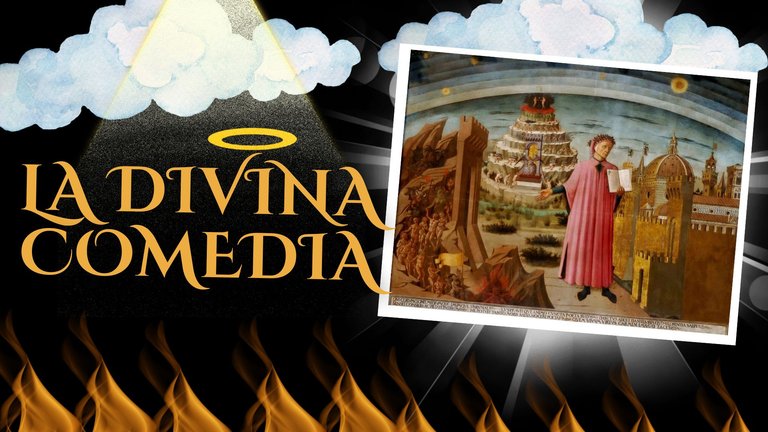
Today I want to talk about a book that I read some time ago and that I recently had the opportunity to read again, it is one of the most famous poems in the world, one of the most famous works of Italian literature, I am referring of course to The Divine Comedy by Dante Alighieri in which the author himself intrudes into his own work as a protagonist to give a more personal and realistic touch to the work, perhaps as a more effective way to teach the audience.
Hoy quiero hablarles de un libro que leí hace tiempo y que recientemente tuve la oportunidad de leer nuevamente, se trata de uno de los poemas más famosos del mundo, una de las obras más célebres de la literatura italiana, me refiero desde luego a La Divina Comedia de Dante Alighieri en la cual el propio autor se inmiscuye dentro de su propia obra como protagonista para darle un toque más personal y realista a la obra, quizá como una forma más efectiva de aleccionar a la audiencia.
Basically the book is divided into three parts: Hell, Purgatory and Paradise. Dante begins his journey by descending into hell in the company of Virgil, a classical Roman poet and author of the Aeneid, and throughout his journey Dante will meet famous people from the culture, politics and religion of his time.
Básicamente el libro se divide en tres partes: Infierno, purgatorio y paraíso. Dante inicia su viaje descendiendo al infierno en compañía de Virgilio quien es un poeta romano clásico, autor de la Eneida, y a lo largo de todas su travesía Dante encontrará a personas célebres de la cultura, política y religión de su época.
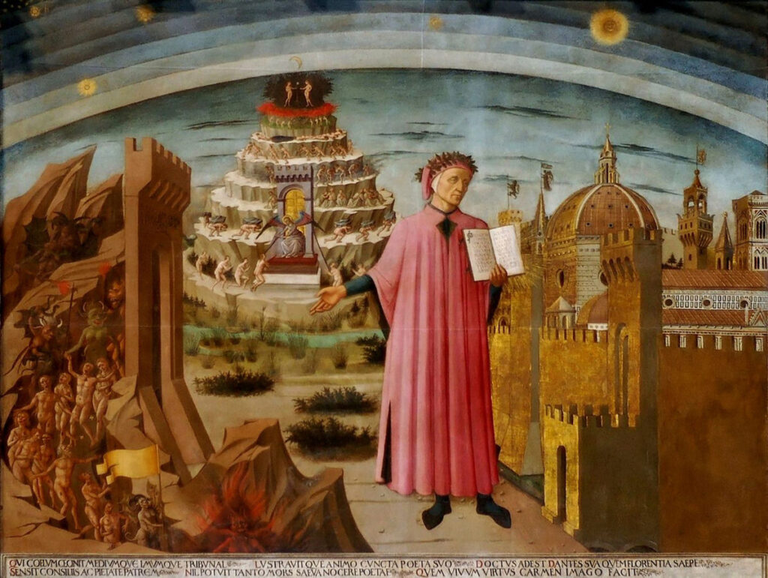
Hell/Infierno
I like the author's descriptions throughout the book, they are very detailed and specific, so much so that the reading is very interesting. For example, at the beginning he tells us that hell is a deep hollow in the shape of a cone that was formed with the impact when God expelled Satan from paradise. It is composed of 9 circles in which demons torment people who died unrepentant or late. Of all this place I am very struck by the punishments imposed, highlighting that of the hypocrites, who are forced to wear a golden robe with lead inside, and that of the suicides, who become trees whose fingers are torn off by harpies just to make them grow back, but definitely the one that seemed the most brutal to me is the last circle, the coldest (for being the most distant place from God) where traitors are punished, and surrounded by all of them is Lucifer with three heads, each one eternally chewing on the three greatest traitors in history: Cassius, Brutus (both Roman leaders who conspired against Julius Caesar) and of course Judas Iscariot (who sold Christ).
Me gustan las descripciones que hace el autor a lo largo de toda la obra, son muy detalladas y específicas, tanto que la lectura resulta muy interesante. Por ejemplo, al inicio nos dice que el infierno es un hueco profundo en forma de cono que se formó con el impacto cuando Dios expulsó a Satanás del paraíso. Está compuesto por 9 círculos en los cuales los demonios atormentas a las personas que murieron sin arrepentirse o que lo hicieron tarde. De todo este lugar me llama mucho la atención los castigos impuestos, destacando el de los hipócritas, que son forzados a llevar una túnica de oro que por dentro lleva plomo, y el de los suicidas, que se convierten en árboles a los que las arpías les arrancan los dedos solo para que estos vuelvan a crecer, pero definitivamente que el que me pareció más brutal es el último círculo, el más frío (por ser el lugar más apartado de Dios) donde se castiga a los traidores, y rodeado de todos ellos se encuentra Lucifer con tres cabezas, cada una masticando eternamente a los tres más grandes traidores de la historia: Casio, Bruto (ambos líderes romanos que conspiraron contra Julio César) y desde luego Judas Iscariote (quien vendió a Cristo)
Reading all this generates a lot of anguish and desolation, especially because you know that they are eternal punishments and that even though they can generate sadness, suffering or empathy you can't do anything for those souls because after all they are living the result of their behavior on earth. Sometimes I think that maybe dante's goal was to make you reflect while you are still alive, while you can do something for yourself, it is simply about the obvious, not to offend God, but it is not just about not blaspheming, but there are thousands of ways to offend him even without realizing it: living in excess, hurting other people, leaving us for anger, lust or greed, in short, perhaps this has been the biggest advertising campaign in the history of mankind, to fight evil and hold on to the good.
Leer todo esto genera mucha angustia y desolación, sobre todo porque sabes que son castigos eternos y que a pesar de que te puedan generar tristeza, sufrimiento o empatía no puedes hacer nada por esas almas porque después de todo están viviendo el resultado de su comportamiento en la tierra. A veces pienso que tal vez el objetivo de dante era hacer que tú reflexiones mientras aún estás vivo, mientras puedes hacer algo por ti mismo, simplemente se trata de lo obvio, no ofender a Dios, pero no se trata de simplemente no blasfemar, sino que hay miles de formas de ofenderlo incluso sin darnos cuenta: viviendo en excesos, lastimando a otras personas, dejándonos por la ira, la lujuria o la codicia, en fin, tal vez esta ha sido la mayor campaña publicitaria en la historia de la humanidad, para combatir el mal y aferrarse al bien
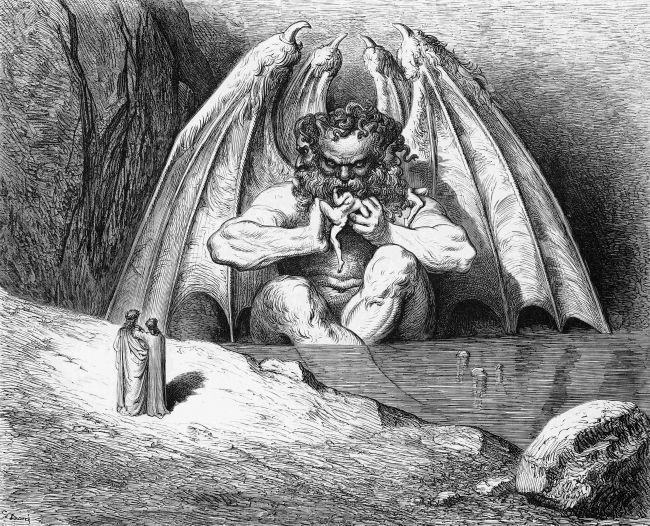
Purgatory/Purgatorio
Purgatory is a high mountain, let's say it is the opposite side of hell, since Dante tells us that when Satan was thrown to the earth the impact created the crater that is where hell is, and at the other end the impact made a mountain grow (Purgatory) There an angel engraves seven letters P on Dante's forehead, and each one of them disappears as he goes forward, approaching the end. That is also a place of suffering and in fact the same sins are punished, but unlike hell, suffering has a purification purpose, it is not eternal, it has an end, people get there because they repented at the last moment, they do not curse God, they want to get there with all their strength, they recognize that they have sinned and they regret it. Purgatory is actually a hope, a light in the midst of darkness, therefore as the protagonist advances we are pleased to know that he is purifying himself in order to reach the pleasant reward of being reunited with his beloved Beatriz.
Él Purgatorio es una montaña elevada, digamos que es el lado opuesto al infierno, ya que Dante nos dice que cuando Satanás fue arrojado a la tierra el impacto creó el cráter que es donde está el infierno, y en el otro extremo el impacto hizo crecer una montaña (El purgatorio) Allí un ángel graba siete letras P en la frente de Dante, y cada una de ellas desaparece conforme él va avanzando, acercándose al final. Ese es también un lugar de sufrimiento y de hecho se castigan los mismos pecados, pero a diferencia del infierno, el sufrimiento tiene un propósito de purificación, no es eterno, tiene un final, las personas llegan allí porque se arrepintieron a último momento, no maldicen a Dios, desean llegar a él con todas sus fuerzas, reconocen que han pecado y lo lamentan. El purgatorio es en realidad una esperanza, una luz en medio de las tinieblas, por lo tanto a medida que el protagonista avanza nos complace saber que se está purificando para poder alcanzar la grata recompensa de reunirse con su amada Beatriz.
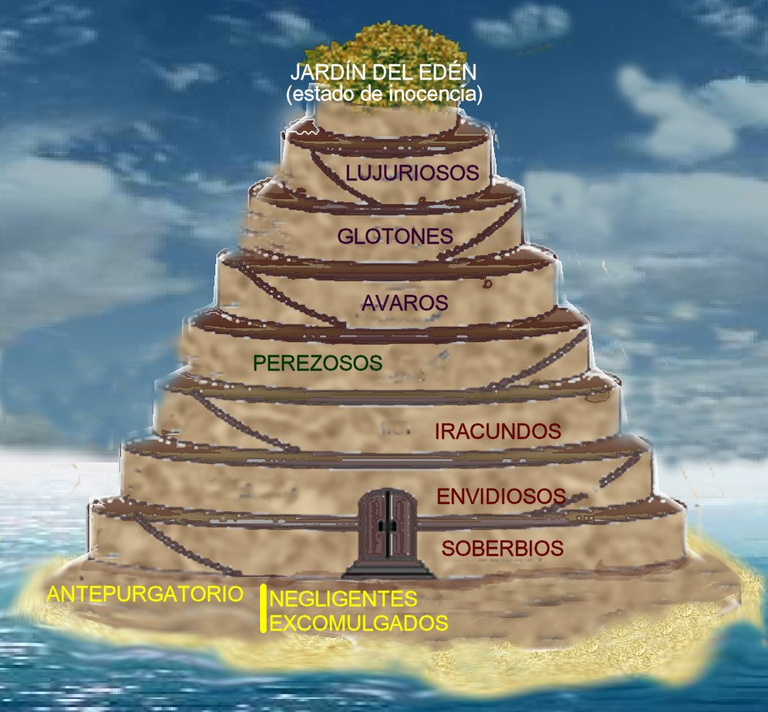
Pradaise/Paraíso
Finally Dante, completely purified is ready to meet his beloved Beatrice in paradise, he can see her, almost perfect and immaculate. This place has also been described with great precision and detail, the place we all dream of going to, with no hate, no evil, no death, no punishment.
Finalmente Dante, completamente purificado está listo para reunirse con su amada Beatriz en el paraíso, puede verla, casi perfecta e inmaculada. Este lugar también ha sido descrito con mucha precisión y detalles, el lugar al que todos soñamos ir, sin odio, maldad, ni muerte, no hay castigos.
If I remember correctly, heaven also consists of nine seats, but the highest and certainly the most important is the Empyrean, which is where the Divine Presence of God and his angels are. The most beautiful thing is that we see how God treats everyone with justice because while in hell the wicked are punished, in paradise the just are rewarded with exactly what they were looking for, and just as it generated anguish to read about how oppressive hell could be, finally you feel blessed to arrive with Dante to the Empyreum, the place of absolute light, where physical limitations disappear.
Si mal no recuerdo, el cielo también consta de nueve escaños, pero el más alto y desde luego, el más importante El Empíreo, que es donde está La Presencia Divina de Dios y sus ángeles. Lo más hermoso es que vemos como Dios trata con justicia a todos porque si bien en el infierno se castiga a los impíos, en el paraíso se recompensa a los justos exactamente con lo que buscaban, y de la misma forma en que te generaba angustia leer sobre lo opresivo que podía llegar a ser el infierno, finalmente te sientes bendecido al llegar junto a Dante al Empíreo, el lugar de luz absoluta, donde las limitaciones físicas desaparecen.
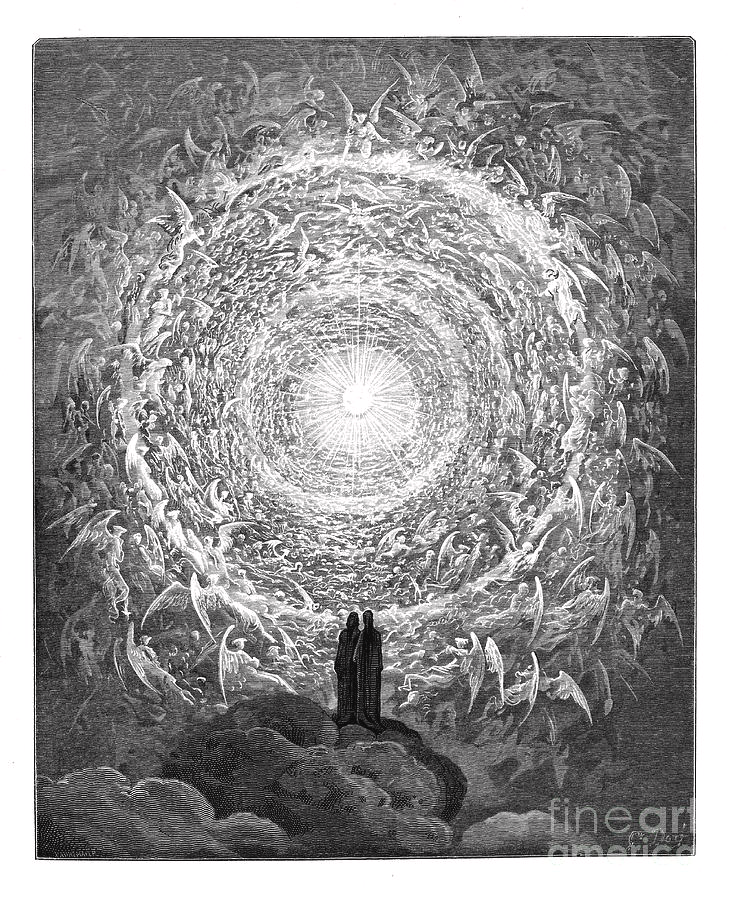
Due to the years of antiquity that it has, the work has a rich language that includes some elements of Latin and Lombard, which could be a little complex for some readers, but not too much and yet it is incredibly fascinating, it is so well written that you feel perfectly how the protagonist suffers seeing the punishment of others, and then how you are purifying yourself at each stage, The Divine Comedy is a journey of introspection and knowledge, so I recommend it wholeheartedly. Thank you very much for your attention in reading this post.
Debido a los años de antigüedad que tiene, la obra tiene un lenguaje rico que comprende algunos elementos del latín y el lombardo, lo cuál podría resultar un poco complejo para algunos lectores, pero no demasiado y aún así es increíblemente fascinante, está tan bien escrita que sientes perfectamente como padece el protagonista al ver el castigo de los demás, y luego como se vas purificando en cada etapa, La Divina comedia es un viaje de introspección y conocimiento, así que lo recomiendo de todo corazón. Muchas gracias por su atención al leer este post.
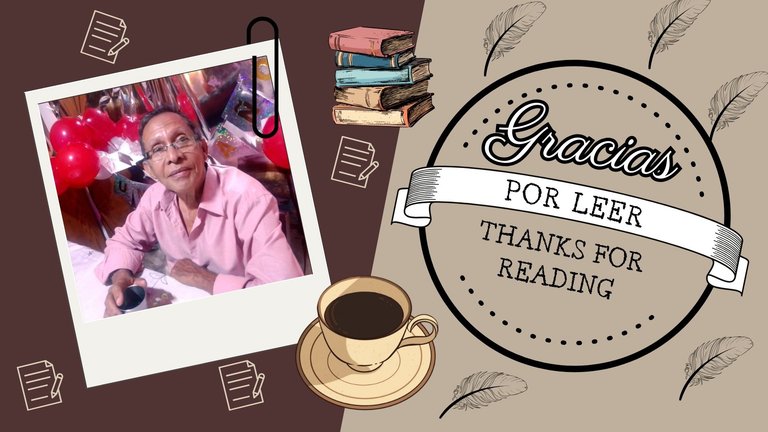
(Imagen hecha con el editor de canva)
Image made with the Canva editor
Woo! You are reading books again after reading for the first time. Well, this happened to me too. The book was "The Three Musketeers".
But this book you mentioned is really interesting as it has three parts and they also have different names. Thanks for sharing.
Yes, it really is a very interesting book, with great spiritual and social depth. Thanks you for reading and comment my post
Congratulations @victor2356!
You raised your level and are now a Minnow!
Check out our last posts:
Ohh thanks a lot, I'm really glad about this
Congratulations on becoming a Minnow @victor2356 🎉🎉🎉
Thanks a lot 😃
You're welcome
BTW, I noticed I miss your witness vote 😢
Do you mind casting one to me? It would be much appreciated!
Thanks a lot 😃
Wow! Pa, este es un super libro, me alegra que te hayas dedicado a analizarlo a profundidad, la visión de Dante sobre el infierno, Purgatorio y Paraíso fue un gran referente para el mundo cristiano, yo también creo que de alguna manera él quiso crear consciencia en la humanidad. Excelente trabajo.
Sí, hija, de verdad que me encantó desde que lo leí por primera vez.
Nunca he leído este libro pero creo que es porque su lectura es demasiado densa para mi, aunque hasta curiosidad me ha dado cada vez que Maire y tu lo han leído, pero lo he intentado y simplemente no avanzo, de todos modos leyendo tu review me doy cuenta de lo interesante que realmente es.
Si te da flojera leer escucha un audiolibro jaja lo importante es el mensaje, recuerda que hay muchas maneras de captar la información bien leyendo o escuchando.